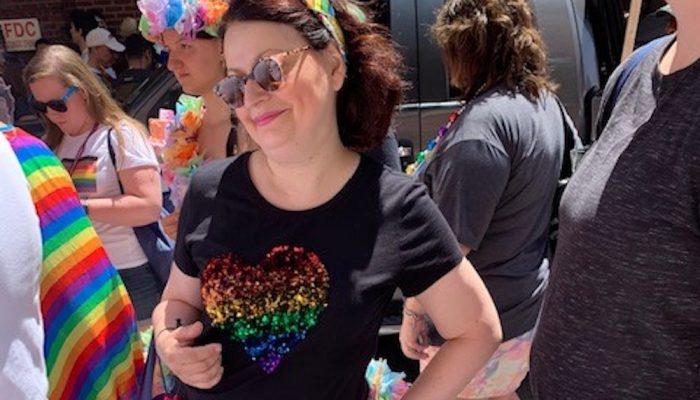Most publicly-funded HIV prevention and treatment programs in and around Philadelphia are under the umbrella of the Health Department’s AIDS Activities Coordinating Office (AACO). At the top of AACO, longtime public health official, and once ACT-UP rabble-rouser, Coleman Terrell serves as director. Due to COVID-19 response needs, Terrell has temporarily moved over to vaccine contracts and other infectious disease operations at the Health Department.
This left an opening at AACO, filled by Dr. Kathleen Brady, MD. But who, exactly, is she and what does she do? And, is this move really temporary? To get these answers, I sat down with the Acting Director (who along with being a medical doctor is a certified sommelier or wine expert) via webcam.
Responses have been edited for space and clarity.
Q: What, exactly, does an epidemiologist do?
A: Basically, we’re numbers people. We study disease and determinants, the things that cause or make diseases worse. We identify contributing factors for acquiring or receiving treatment for specific diseases or, in terms of what we do here at AACO and HIV, who is accessing services and how well they’re doing as a result.
Q: Did you always want to be an epidemiologist? It’s a big word for an adult let alone a kid.
A: No, actually, I wanted to be an art teacher! And I still love art, but by the time I was in eighth grade, I decided I wanted to be a doctor. The simplest answer is twofold: I’ve always been a science and math person; and – it’s one of those things you frequently hear – I wanted to help people.
Q: We recently observed Women’s History Month in March. There’s always discussion of women in STEM fields. You weren’t limited or put into a role growing up as a girl or young woman?
A: No! I was privileged in that there was no difference between myself and my sister and brother in terms of what we could achieve. We were taught that we could dream and reach out for anything that we wanted to do. That has a lot to do with my mother but also my dad; education lifted him out of poverty. My mother on the other hand didn’t go to college. For women like her, born in 1927, it wasn’t really an option to study medicine. She learned shorthand and typing.
Q: I’d imagine she was proud of you.
A: She was incredibly proud of me. She wanted all of her kids to succeed but especially wanted equal opportunity for my sister and myself.
Q: You’re now the Acting Director here at AACO. How temporary is that really?
A: I’ve been told it’s temporary. When I accepted doing it, I did so with the knowledge it was temporary!
Q: But working in HIV hasn’t been temporary. It seems like a lifelong mission. Why is that?
A: It’s a passion for the work for me, which is why [Director] Coleman [Terrell] will be back, because I know he feels the same way. HIV is my chosen field. I don’t want to do anything else until we end the HIV epidemic. It’s been my professional passion for almost 30 years now, since the 1990s. It’s why I went into infectious diseases.
Q: Tell me more about that. How do those origins land you here?
A: Quite frankly, it’s the people. I cared for a number of people living with HIV during my residency. At that time, we didn’t have treatments like we do today.
Q: A lot of the care was palliative and hospice-oriented, I’d imagine. What was it about the people you worked with that made such an impression?
A: It’s one of those things, you know? I was really picked on as a kid. I had some difficult times. I’m not just talking a period of time during middle school, I mean from kindergarten right up to graduation. Kids can be mean. Initially, and still to some degree today, people living with HIV were stigmatized, disenfranchised, on the outside looking in and excluded at a critical moment for them. To some extent, I empathize and identify with that.
Q: It sounds personal, like there’s an engine driving you to push back against something you perceive to be wrong, like inequality or a lack of equity overall.
A: You don’t even want to know. There are conversations I’ve had with insurance companies, even letters to other government bodies, where I accuse them of bias, institutional racism, malpractice. Where I tell the truth as I see it. If I sense something wrong, something unfair, a switch gets flipped. And I won’t let it go.
Q: Taking the helm here at AACO must be challenging. We have a $55 million budget, numerous providers, competing agendas and goals.
A: I’m getting better at it every day. You don’t know what you don’t know and once I started this temporary role I started to learn so much more. Budgets are what stick out to me. There are so many funding sources and requirements of each of those funders. Plus, there are pretty big decisions we have to make – and now some of them are mine to make.
Q: Does that scare you? It would scare me if I were you.
A: Yes! It’s a lot of responsibility. Every time I hear that figure, a $55 million budget, I feel like I need to get a paper bag!
Q: What would you say to consumers or providers who are, understandably, a bit guarded whenever a change, even a temporary one like this, happens?
A: There will be no disruption in services. Plus, this is very much an active, living, temporary transfer between Coleman and myself. We talk every work day, almost every day even on weekends. We’re fortunate at AACO because of the staff and Coleman’s work here, there’s a roadmap. It makes failure impossible. The stakes are high and require this kind of approach, especially since under Coleman’s leadership we’re disrupting the status quo through the “Ending the HIV Epidemic in Philadelphia” community plan.
Q: Taking on this temporary role along with your existing role after 11 months on COVID-19 deployment is a lot. Lots of people are burned out under similar circumstances. How do you keep from burning out?
A: Take it one day at a time. Prioritize. Delegate. And maintain some work and personal life balance. I sit down and have dinner with my family every night, no matter what. Except Fridays.
Q: What’s on Friday?
A: I have a Zoom with some friends.
Q: Given you’re from Massachusetts originally, I’d imagine webcams help stay connected to family and friends, pandemic or otherwise. But, I’m afraid to ask this question, which baseball team do you root for?
A: I most certainly am a Boston Red Sox fan!
Editor’s note: Nobody’s perfect.



